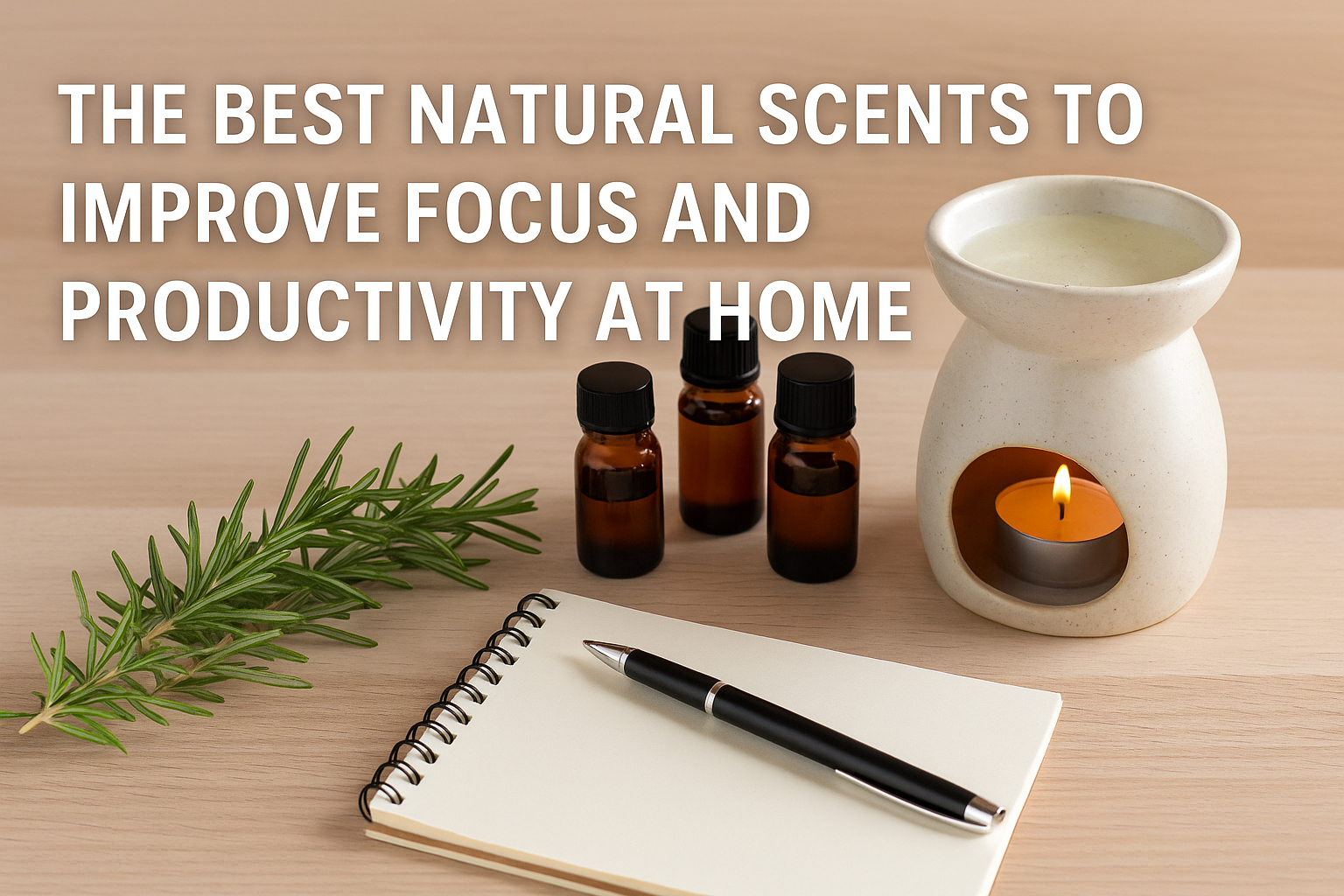Staying focused at home can be difficult. Whether you work remotely, study for exams, or manage a household, distractions are everywhere.
Social media, background noise, and daily stress quickly reduce concentration. Many people rely on caffeine or energy drinks to stay alert, but those often lead to jittery energy and later crashes.
A natural, gentler, and more sustainable option is the use of scents from herbs, citrus, and essential oils.
Fragrance is more than a pleasant background. Certain aromas have measurable effects on memory, mood, and mental clarity.
Rosemary, peppermint, and citrus oils, for example, are scientifically linked to sharper concentration. By making scents part of your daily environment, you can create a workspace that supports productivity instead of sabotaging it.
This article explores the science of why scents affect focus, the best herbs and oils to use, different DIY blends, seasonal strategies, and daily routines. It also shares cultural practices from the past and answers common questions.
Why scents improve focus
The sense of smell connects directly to the brain’s limbic system, which regulates emotions and memory. Unlike other senses, scent bypasses complex processing and triggers immediate responses. This is why a smell can suddenly bring back a memory or change mood in seconds.
Certain aromas stimulate alertness, increase oxygen flow to the brain, and balance neurotransmitters. Rosemary improves recall and accuracy, peppermint reduces fatigue, and citrus aromas increase motivation. The result is a natural boost in focus and productivity without relying on stimulants.
Benefits of using natural scents for productivity
They improve memory and recall, especially useful for students. They reduce mental fatigue during long work sessions.
They uplift mood and reduce stress, indirectly boosting focus. They avoid synthetic fragrances that may irritate lungs. They connect daily life with traditions of using plants for clarity and wisdom.
Key scents for focus and productivity
Rosemary
Known as the “memory herb,” linked to improved cognitive performance.
Lemon
Bright and sharp, perfect for clearing mental fog.
Peppermint
Refreshing, reduces tiredness, increases alertness.
Orange
Uplifting, reduces tension during stressful work.
Sage
Grounding, clears mental clutter, supports balanced thinking.
Marcela
Traditional Gaúcho herb, soothing yet steady for focus.
Basil
Stimulates creativity and flow states.
Eucalyptus
Cleanses air, clears breathing, supports concentration.
Ginger
Adds warmth and energy, reduces sluggishness.
Methods of using scents
Diffusers
Add 6–8 drops of essential oils to water. Use during study or work sessions.
Room sprays
Mix 200 ml water, 1 tsp alcohol, and 15 drops of oil. Spray workspace before starting tasks.
Candles
Soy candles infused with rosemary, basil, or lemon for steady fragrance.
Simmer pots
Boil water with citrus peels and rosemary sprigs for hours of natural aroma.
Herbal sachets
Dried mint or rosemary near desk for subtle freshness.
Inhalers
Personal inhalers with cotton soaked in oils, useful during study breaks.
DIY blends for focus and productivity
Memory Boost Blend
- 4 drops rosemary
- 3 drops lemon
- 2 drops peppermint
Creative Flow Blend
- 4 drops orange
- 3 drops basil
- 2 drops lavender
Calm Focus Blend
- 4 drops marcela
- 3 drops sage
- 2 drops lemon
Energizing Work Blend
- 4 drops peppermint
- 3 drops orange
- 2 drops rosemary
Exam Study Blend
- 5 drops rosemary
- 3 drops peppermint
- 2 drops lemon
Morning Motivation Blend
- 4 drops grapefruit
- 3 drops ginger
- 2 drops rosemary
Anti-Fatigue Blend
- 5 drops eucalyptus
- 3 drops peppermint
- 2 drops orange
Balanced Evening Focus Blend
- 4 drops lavender
- 3 drops orange
- 2 drops rosemary
Brainstorming Creativity Blend
- 4 drops basil
- 3 drops lemon
- 2 drops peppermint
Work Stress Relief Blend
- 5 drops chamomile
- 3 drops lavender
- 2 drops orange
Seasonal scent strategies
Spring
Use lemon and rosemary to awaken clarity after winter.
Summer
Peppermint and lime for cool freshness and sustained alertness.
Autumn
Orange and sage for balance during busy schedules.
Winter
Marcela and rosemary to stay focused indoors during long nights.
Daily routines with scents
Morning
Diffuse rosemary and lemon while planning tasks. They sharpen focus and bring clarity.
Midday
Spray peppermint-orange mist in your workspace to recharge energy after lunch.
Afternoon
Simmer sage, rosemary, and citrus peels to sustain concentration during long sessions.
Evening
If you continue working late, switch to calmer blends like marcela and lavender, which maintain focus without overstimulation.
Weekly
Choose one day, like Sunday evening, to reset your workspace with a sage and rosemary simmer pot, symbolically clearing distractions.
Cultural traditions and focus
Rosemary sprigs were worn by Greek students during exams to improve memory. In Gaúcho homes, citrus peels were simmered after meals to refresh and energize kitchens. Sage has been burned for centuries to cleanse spaces and bring clarity. These traditions highlight the timeless link between scent and mental clarity.
Mistakes to avoid
Do not overload essential oils—too much may cause headaches. Do not diffuse stimulating oils like peppermint late at night. Do not rely only on scent; pair with breaks and good hydration. Do not use oils directly on skin without dilution.
Frequently Asked Questions
Do scents really improve memory and productivity?
Yes. Research shows rosemary and peppermint can improve recall, accuracy, and sustained attention.
How long should I diffuse oils?
Thirty to forty-five minutes is ideal. Longer may overstimulate.
Can I mix oils?
Yes, blends are often more effective. Citrus for motivation plus rosemary for focus is a classic combination.
Are natural scents safe for children?
Yes, but use gentle oils like orange or lavender in lower amounts. Avoid peppermint for children under six.
Can I use dried herbs instead of oils?
Yes, simmering rosemary or citrus peels produces a gentler but effective aroma.
Do oils lose strength over time?
Yes, most last one to two years if stored in dark glass bottles away from heat.
Can scents replace caffeine?
They don’t replace caffeine but help sustain natural alertness without crashes.
Which scent works best for studying?
Rosemary combined with lemon is especially good for study sessions and exams.
Are there scents for creativity?
Yes, basil and orange stimulate brainstorming and creative flow.
Do these methods work in shared spaces?
Yes, just choose subtler aromas like lavender or lemon to avoid overwhelming others.
Conclusion
Natural scents are powerful allies for focus and productivity.
With rosemary, lemon, peppermint, sage, marcela, orange, basil, eucalyptus, and ginger, you can design blends that sharpen memory, sustain energy, and reduce stress.
Diffusers, sprays, candles, sachets, and simmer pots make it easy to integrate these scents into daily life.
By building routines with natural fragrances, you create more than pleasant air—you design an environment that supports deep work, creativity, and mental clarity. Every breath becomes a step toward greater productivity and balance.

Marcela Cardozo is passionate about Southern Brazilian traditions and the cultural stories carried through natural scents. She blends knowledge of native herbs, essential oils, and regional rituals to create practical and inspiring content. Her writing connects ancestral wisdom with modern living, offering readers simple ways to bring authenticity, well-being, and meaning into their everyday lives.
